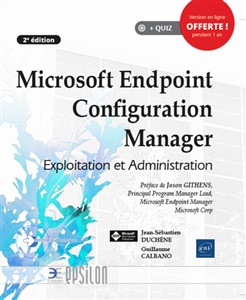L’équipe Microsoft Learning a annoncé quelques semaines
auparavant, le lancement de la phase de beta-testing des certifications
relatives à Lync Server 2010.
Aujourd’hui les personnes ayant postulées et mises à jour leur profile SME ont
pu recevoir le code de promotion permettant de s’inscrire au beta-testing de la
certification : 71-664: TS: Microsoft Lync Server 2010, Configuring.
Notez que cette certification prendra part à l’obtention du statut : MCITP: Microsoft Lync Server 2010 Administrator.
Cet examen reprend les notions suivantes :
|
Managing Users and Client Access (20 percent) · Configure user accounts. o This objective may include but is not limited to: enabling Active Directory users, moving users, applying policies to users, and managing users in bulk · Deploy and maintain clients. o This objective may include but is not limited to: deploying Communicator, configuring group policy, configuring client version policy, deploying the Attendee/Attendant consoles · Configure conferencing policies. o This objective may include but is not limited to: configuring general conference settings, configuring A/V settings, configuring Web conferencing settings, and configuring Application Sharing settings · Configure Instant Messaging (IM) policies. o This objective may include but is not limited to: file transfer filters and URL filters · Deploy and maintain Lync Server 2010 devices. o This objective may include but is not limited to: publishing device updates, configuring device policies, managing and deploying common area devices and analog devices · Resolve client access issues. o This objective may include but is not limited to: enabling/disabling logging, using Snooper to open and navigate trace file, troubleshooting EWS and Address Book errors, using client tools to troubleshoot connectivity issues, and troubleshooting certificate errors NOT: synthetic transactions Configuring a Lync Server 2010 Topology (21 percent) · Prepare to deploy a topology. o This objective may include but is not limited to: installing local configuration stores, provisioning servers in Active Directory, modifying features and roles on Windows servers, preparing DNS, deploying the Central Management Store · Configure Lync Server 2010 by using Topology Builder. o This objective may include but is not limited to: configuring site details, configuring simple URLs, site federation route, configuring Lync Server roles and pools, and using the Best Practices Analyzer to validate deployment · Configure role-based access control in Lync Server 2010. o This objective may include but is not limited to: creating and assigning roles · Configure a location information server. o This objective may include but is not limited to: configuring LIS with WIndows PowerShell, creating and assigning location profiles, associating addresses with physical locations, and enabling/disabling E911 disclaimer · Configure server pools for load balancing. o This objective may include but is not limited to: configuring server pools for hardware load balancing and DNS load balancing Configuring Enterprise Voice (19 percent) · Configure voice policies. o This objective may include but is not limited to: user, site, and global, configuring phone usages, and running test cases · Configure dial plans. o This objective may include but is not limited to: normalization, assessing impact of trunk groups, and accommodating PBX coexistence · Manage routing. o This objective may include but is not limited to: configuring and troubleshooting voice routing · Configure Microsoft Exchange Unified Messaging integration. o This objective may include but is not limited to: dial plans and policies · Configure dial-in conferencing. o This objective may include but is not limited to: configuring access numbers and dial-in participant settings · Configure call admission control. o This objective may include but is not limited to: configuring and troubleshooting Bandwidth Management · Configure Response Group Services (RGS). o This objective may include but is not limited to: configuring agents, RGS groups, RGS queues, and RGS workflow · Configure Call Park and Unassigned Number. o This objective may include but is not limited to: feature interaction · Manage a Mediation Server pool and PSTN Gateway. o This objective may include but is not limited to: creating and configuring a Mediation Server pool, configuring Media Bypass, configuring Gateway settings, and coexistence and migration considerations Configuring Lync Server 2010 for External Access (19 percent) · Configure Edge Services. o This objective may include but is not limited to; configuring Director Services, creating and configuring external access pools, and configuring federation · Configure a firewall. o This objective may include but is not limited to: IP addresses, port settings, NAT, and routing · Configure a reverse proxy. o This objective may include but is not limited to: configuring certificates, Lync Server Web components, and Autodiscover Monitoring and Maintaining Lync Server 2010 (21 percent) · Backup and restore Lync Server 2010. o This objective may include but is not limited to: SQL databases and instances, contacts with dbimpexp, topology with Topology Builder, topology with PowerShell and file shares, and activating CMS on a new front end · Configure monitoring and archiving. o This objective may include but is not limited to: reporting services and SQL, archiving IM and Group Chat, monitoring A/V quality, and compliance considerations · Implement troubleshooting tools. o This objective may include but is not limited to: analyzing events logged in Windows Event log, creating a trace file with OCSLogger, analyzing troubleshooting data, and selecting a troubleshooting tool · Use PowerShell to test Lync Server 2010. o This objective may include but is not limited to: proactively testing connectivity and topology and using synthetic transactions |
La phase d’inscription prendra fin lorsque le quota de
beta-testeur aura été atteint. N'attendez pas ...
La période de passage aura lieu du 22 Décembre au 14 janvier 2010.
Enfin le code de promotion est : UCTSJ
Rendez-vous sur le site de prometric pour vous inscrire. Bon Courage !
Plus d'informations sur cet examen : http://www.microsoft.com/learning/en/us/exam.aspx?ID=70-664#tab2




